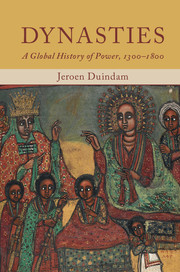Book contents
Conclusion
Published online by Cambridge University Press: 05 October 2015
Summary
I see a good king, I die happy.
Woman embracing the knees of Louis XVI on 21 June 1786 during his visit to Cherbourg.We have a great resource in the paternal feelings of the king and I cannot tell you how much love and respect he inspires in us.
Jean-François Campmas, deputy to the Estates General in a letter to his brother, 30 May 1789, cited in Timothy Tackett, Becoming a Revolutionary (Princeton, NJ, 1996), 151.One cannot reign innocently. The folly of doing so is evident. Every king is a rebel and a usurper. Did kings themselves treat differently the usurpators of their authority?
Saint-Just, ‘Discours concernant le jugement de Louis XVI’, 13 November 1792.Outcomes
How can this bird's-eye view of themes in global dynastic power contribute to our understanding of the human experience? After recapitulating some outcomes of the previous chapters, I will consider regional typologies and change over time, and finally explore the legacies of dynastic power in our own age.
Kings and emperors were universally expected to safeguard harmony, justice, and the common good. Rulers held responsibility for the well-being of their peoples and for the harmonious connections between heaven and earth. These ideals were taken seriously by princes and by their subjects, yet they took different shapes across the globe. In the Confucian canon, exemplary moral behaviour and ritual propriety were valued above political acumen or military activism. The ideal of the ruler as virtuous world-renouncer was strongly present in Indic kingship, yet it competed with the equally compelling model of the active world-conqueror. In the nomadic polities of Central Asia, prowess and martial leadership were indispensable assets for any ruler. West Asian sultans and European kings, too, were expected to lead their armies on the field of battle, to outmanoeuvre rivals, and to befriend elites. In Africa, outspoken martial and active ideals of kingship can be found alongside views stressing the ritual, magic, and moral supremacy that severely restricted the activities of incumbents. The status of Confucian literati, Brahmins, Buddhist or Daoist monks, ulema, African witch doctors, and Christian priests, as well as the measure to which the ruler himself could aspire to a supreme sacral role, moulded dynastic traditions.
- Type
- Chapter
- Information
- DynastiesA Global History of Power, 1300–1800, pp. 286 - 318Publisher: Cambridge University PressPrint publication year: 2015



